Have you noticed that your cat’s belly seems bloated or a little larger than normal? You may be wondering what is causing this change in appearance. There are a few things that could be going on inside your cat’s tummy. In this article, we’ll explain these possibilities, give you signs of illness to watch out for, and tell you what to expect at the vet. We’ll also give you some tips to keep your cat healthy, although not all causes of bloating are preventable.


What is bloating?
Bloating is when your cat’s abdomen becomes larger than normal. It is a vague sign and is not a disease in itself. Bloating can occur in any cat at any age. A variety of conditions can cause bloating.
Another term for abdominal bloating is “bloating,” which you may have heard your vet refer to. Some cases of abdominal bloating can be serious, so it’s important to monitor your cat closely if it is bloated.


What are the signs of abdominal bloating?
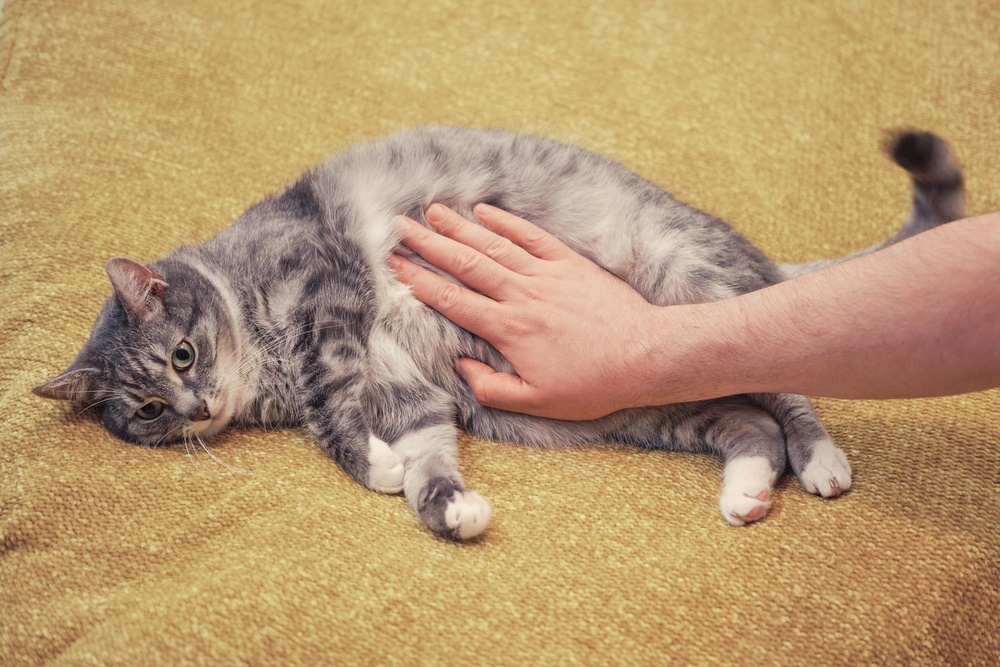
The only consistent sign of abdominal bloating is abdominal distension, but other signs may accompany abdominal bloating depending on the underlying cause. If your cat is experiencing abdominal bloating, you should evaluate their behavior so that you can describe exactly what is going on at home to your vet.
Signs to look out for include:
- Changes in appetite and thirst
- diarrhea
- vomiting
- Apathy
- Coughing or difficulty breathing
- Changes in urination
- Pale gums
- pain
- Weight change
What causes bloating?
If your abdomen appears bloated, it could be because something is wrong with it. Blood and fluids can accumulate outside the organs, a condition called ascites. Fat and pregnancy can also cause abdominal bloating. Your organs can swell for a variety of reasons, making your abdomen appear larger than normal.
Some underlying causes of bloating include:
- pregnancy: If you have an unneutered female cat, she may be pregnant. When she is pregnant, her abdomen may swell during the approximately two months of pregnancy. As she gets closer to giving birth, her nipples may become enlarged.
- obesity: Excessive calorie intake leads to fat accumulation around the cat’s body. The main areas where cats store this fat are the abdomen and the bursa, which is a fold of skin under the abdomen. Fat also covers the ribs.
- overeating: If your cat devours food that has been left out, it may have a distended, bloated stomach. This is especially noticeable in skinny cats and kittens. If this is the case, you should make sure your cat isn’t eating something toxic and monitor her for signs of gastrointestinal upset.
- Gassiness: Some digestive issues can cause excess gas that bloats the abdomen, so if your cat is exhibiting gastrointestinal symptoms along with mild abdominal bloating, this could be the cause.
- Parasites: Intestinal worms can cause abdominal bloating, which is easily cured with a broad-spectrum deworming treatment, however, in kittens in particular, worms can cause problems such as anaemia and diarrhoea which may require further treatment.
- infection: An infection in the abdomen can lead to a buildup of pus, which can collect in a pocket and become a condition called an abscess, or a ruptured intestine can cause an infection of the entire abdominal cavity.
- Infectious peritonitis in cats: Feline infectious peritonitis (FIP) is a viral disease that causes fluid to build up in the abdomen. It is most common in young cats. There are now very effective medications to treat FIP.
- Gastrointestinal obstruction: Gastrointestinal blockages usually occur when a cat eats something they can’t digest and it gets stuck in their system. This can result in severe vomiting and either no bowel movements or only small, soft stools.
- Urinary obstruction: If your cat is unable to urinate, their bladder may enlarge, causing a slight sensation of distension. Urinary blockage is common in male cats but rare in female cats. It can quickly become life-threatening and is an emergency.
- Congestive heart failure: When the heart can no longer pump blood efficiently, fluid builds up in the lungs and abdomen. Congestive heart failure can be treated with medication but can be life-threatening.
- cancer: Cancer in the abdomen can cause an abdominal mass, which can cause organs to shift to the side, taking up space and making the abdomen swollen, or the cancer can cause fluid to leak, resulting in ascites.
- Uterine infection: Uterine infection (the medical term is pyometra) is rare in cats, but if it occurs it can lead to an enlarged uterus, which can make the abdomen appear bloated.
- Cushing’s disease: Although this is also rare in cats, Cushing’s disease can cause hair loss and abdominal distension, which is usually caused by an enlarged liver and increased abdominal fat.


Diagnosing abdominal bloating in cats
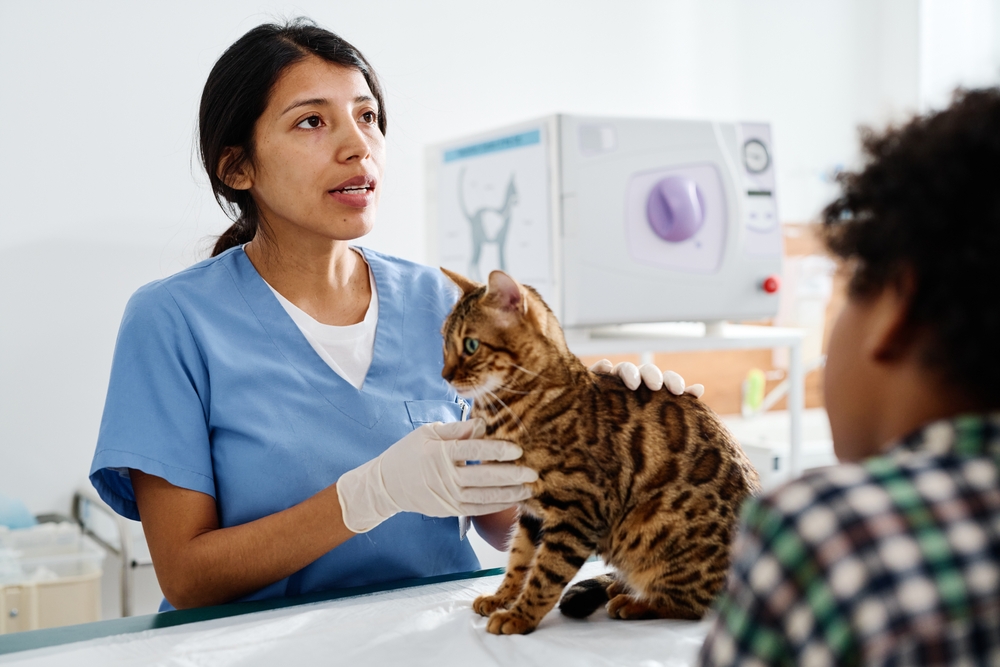
To diagnose the cause of your cat’s gastric bloat, you will need to book a veterinary appointment. Some cases of gastric bloat may require emergency veterinary attention. If your cat collapses, is unable to urinate or has difficulty breathing, we recommend an immediate visit to our after-hours clinic.
Emergency veterinary care may also be required if your cat isn’t eating or drinking, or is losing large amounts of fluid through vomiting or diarrhea and is at risk of dehydration. Similarly, if your cat is lethargic, has a fever or has pale gums, you should seek help as soon as possible.
What to expect from a vet
Your veterinarian will take your cat’s temperature, palpate its abdomen, and examine it. They will also ask questions about your cat to understand its illnesses, lifestyle, and general medical history. These factors will help your veterinarian determine which causes of your cat’s abdominal bloating are the most likely.
If your cat’s symptoms are relatively simple, your vet will likely be able to provide a treatment plan and preliminary diagnosis based on their examination, however, further diagnostic tests may be needed to determine the cause of your cat’s illness.
These tests include:
- Blood test
- Stool testing
- Urinalysis
- Diagnostic imaging such as ultrasound and x-rays
- Ascites sample collection and cytology
- biopsy
Your veterinarian will develop a treatment plan based on your cat’s diagnosis. For example, if your cat is pregnant, your veterinarian will provide instructions for helping her give birth and raise the kittens.
Your cat may need to change their diet or lose weight. If they’re unwell, they may need medication or hospitalization. Some cats may need surgery to recover. Cats with cancer may need to undergo radiation therapy or chemotherapy.
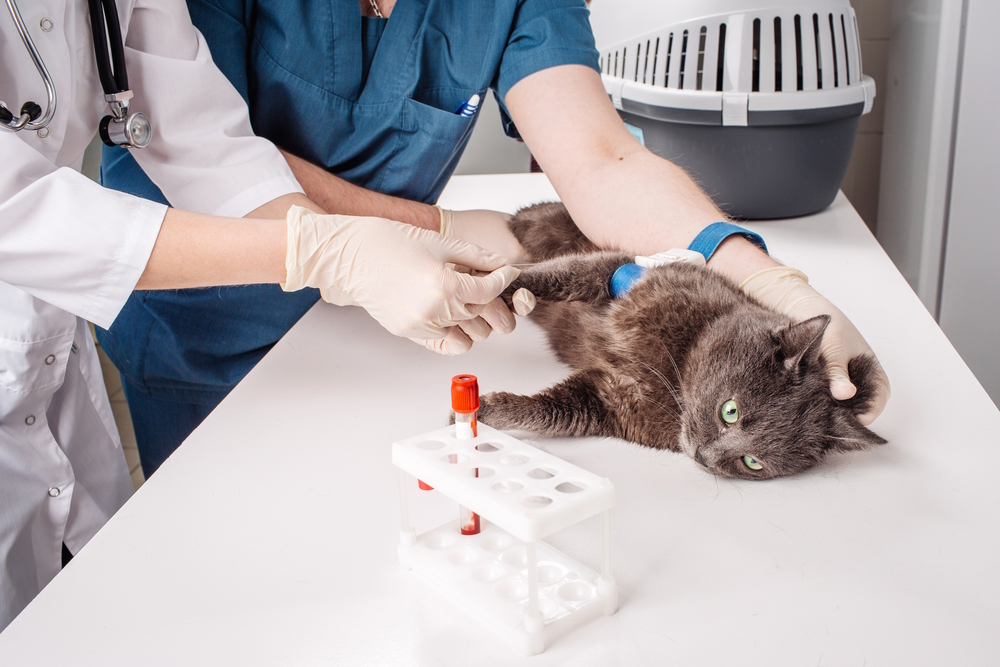


How do I care for a cat with abdominal bloating?
As you know, many causes of abdominal bloating are serious, but some are easily treatable. If you’re concerned about abdominal bloating, you should first take your cat to the vet. Treatment for your cat depends on the underlying cause and can range from weight loss to deworming medications or even surgery.
There are several ways to prevent the causes of bloat in cats, mainly by taking good care of your pet.
diet
Cats need a good quality, nutritionally balanced diet to stay in top condition. Kittens need a special diet with more protein and calories to promote growth. Older cats and cats with certain health conditions can also benefit from a special diet.
For healthy adult cats, you can choose wet food, dry food, or a combination of both. We recommend using meat-based brands, ideally made with quality, all-natural ingredients. If your cat has digestive or other health issues, your vet can advise you on the best food options.
Portion Control
Stay healthy Body Condition Score This is essential for your cat’s health, as overweight cats are more prone to joint problems, diabetes, urinary problems and cancer.1Exercise and play can help your cat lose weight, especially if they’re a sedentary indoor cat, but feeding them the right calories is even more important.
Commercial cat foods usually come with a feeding guide, but it’s important to note that this is only a guide and doesn’t take into account factors like your cat’s metabolism, health, activity level, weight, etc. Therefore, you may need to adjust the feeding amount depending on your cat’s weight and your vet’s recommendations.
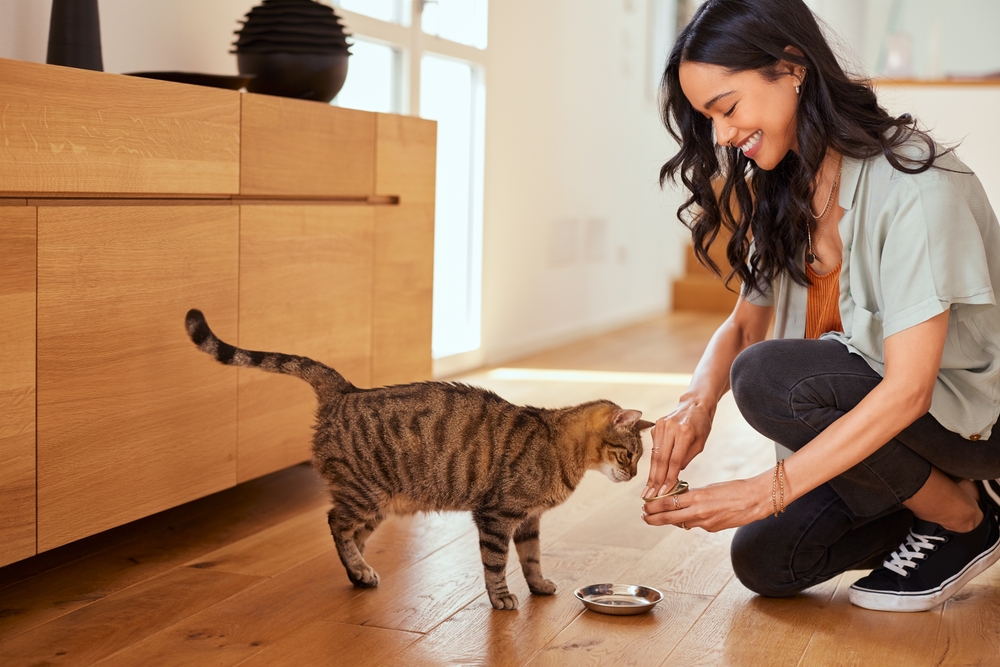
health check
Taking your cat for regular health checks can help catch any problems early. Health checks involve examining your cat and vaccinating her if necessary. Your vet can also discuss any health or behavioral concerns you may have during these routine checkups.
Parasite prevention
Parasite preventatives are available over the counter, but many only require a prescription from your veterinarian. Adult cats should be dewormed every three months, and kittens every two to four weeks depending on their age. In addition to intestinal parasites, heartworms, fleas, mites and ticks can also be prevented with regular preventative medication. These medications will keep your cat in good health.
Spaying and neutering
Neutering your cat eliminates the possibility of unwanted pregnancy. With so many cats and kittens waiting to be adopted, it is unethical to allow cats to breed unless you are a registered, responsible breeder. Neutering also helps prevent certain diseases, such as uterine infections, ovarian cancer and testicular cancer.


FAQ
What does abdominal bloating look like in cats?
A bloated abdomen will look like a distended belly that is much larger than it normally appears. Fluid buildup in the abdomen may make it feel like a water balloon. A bloated abdomen may feel hard or doughy. Your veterinarian may feel a lump or kitten-like sensation when the abdomen is bloated.
What does the abdomen look like in FIP?
Feline infectious peritonitis (FIP) usually causes fluid to build up in the abdomen. The abdomen of a cat with FIP is filled with fluid and feels like a water balloon. If you tap the abdomen, you may feel a wave of fluid on the other side.
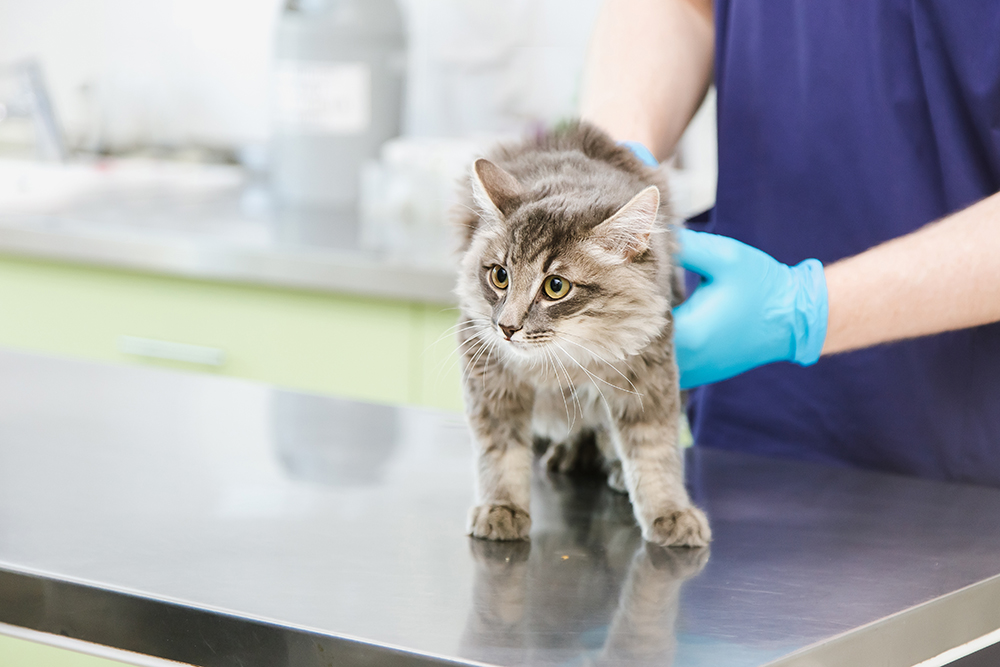
Why is my cat’s belly so big?
The cause of your cat’s bloated belly could be due to some kind of distension. Your cat’s age, breed, medical history, and signs at home can help your vet guess what’s causing your cat’s bloated belly. If your cat shows signs of illness, you should take them to the vet.


Conclusion
Abdominal bloating in cats can be a sign associated with pregnancy, weight gain, overeating or illness. You should watch your cat closely for other signs and visit your vet if she continues to be unwell or bloated. Most cases of extreme bloating require emergency veterinary treatment.
Featured image credit: Zhuravlev Andrey, Shutterstock




